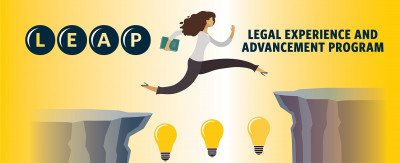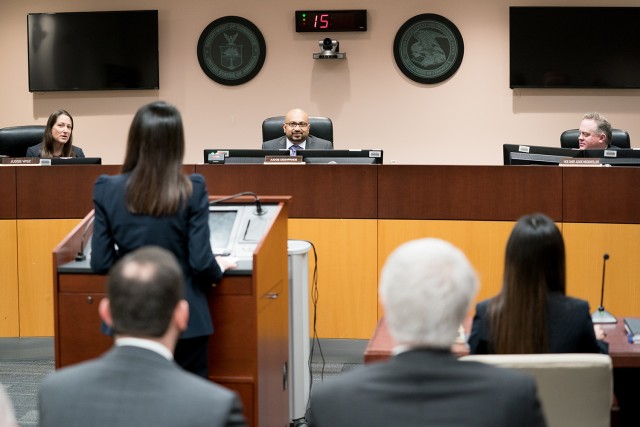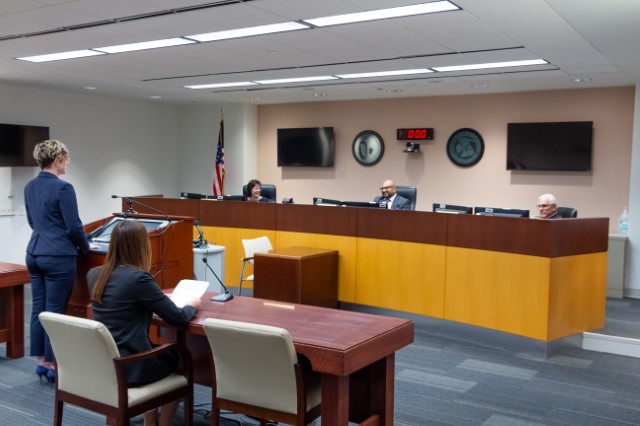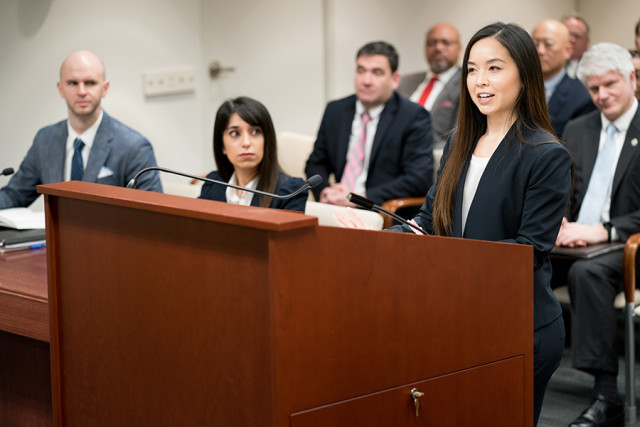As part of its commitment to fostering a strong and vital patent system, the United States Patent and Trademark Office (USPTO) has developed and implemented the Legal Experience and Advancement Program (LEAP). This program provides training and oral advocacy opportunities for less experienced advocates in proceedings before the Patent Trial and Appeal Board (PTAB).
This practical experience helps advocates support and represent their clients’ interests more effectively. Additionally, as part of the program, the PTAB may grant up to 15 minutes of additional argument time to each party that chooses to participate, depending on the length of the proceeding and the PTAB’s hearing schedule.
See the LEAP brochure, LEAP statistics, and this page for more information about the program. View images from previous LEAP events below.
Eligibility
As of November 18, 2021, the USPTO has removed the requirement that practitioners must have seven or fewer years of experience to qualify for LEAP.
To qualify as a LEAP practitioner, a patent agent or attorney must now have three or fewer substantive oral arguments in any federal tribunal, including the PTAB.
Pro bono arguments (including PTAB pro bono arguments) do not count toward a practitioner's limit of three or fewer substantive oral arguments. Practitioners with questions about LEAP eligibility may seek guidance by emailing LEAP@uspto.gov.
LEAP participation requests
To participate in LEAP, a practitioner must submit a Request and a Verification form to PTABHearings@uspto.gov at least five business days before the hearing.
Submission of a combined LEAP Practitioner Request and Verification Form is preferred. If a practitioner elects not to use this combined form, the information contained in the form must be provided in the practitioner’s alternate submissions.
Practitioners must not submit a request or verification form until the Board has assigned an oral hearing date for the proceeding in which LEAP participation is requested. If a hearing date has not been assigned, the request will be denied as premature.
Oral hearing
A LEAP practitioner may conduct the entire oral argument or may share time with other counsel, provided that the LEAP practitioner is offered a meaningful and substantive opportunity to argue. The type and length of oral argument that will be conducted by the LEAP practitioner remains within the party’s discretion. For example, a LEAP practitioner might present the party’s entire argument or might argue a more limited issue, e.g., claim construction arguments, motions to exclude evidence, or patentability arguments.
Statistics
Data for the LEAP program from May 2020 through November 2023 can be found through the link below. This data includes the total number of LEAP requests, with the breakdown of requesting party and proceeding type. This data will be published on a quarterly basis.
LEAP recognition
During the first two years of LEAP, from May 2020 to May 2022, more than 100 practitioners have participated in oral arguments in actual cases—both ex parte appeals and AIA trial proceedings. We recognize these practitioners along with their sponsors and employers who supported their participation and gave them the opportunities. Additionally, we commend sponsors who enabled participation of more than one LEAP practitioner over the past two years. Read more about LEAP practitioners and their sponsors below.
Assistance at oral hearing
Regardless of whether a LEAP practitioner conducts the argument in whole or in part, the PTAB will permit more experienced counsel to assist a LEAP practitioner, if necessary, during oral argument, and to clarify any statements on the record before the conclusion of the oral argument.
LEAP preparation
The PTAB will offer training on oral advocacy, covering topics such as the use of demonstratives, effective use of hearing time, decorum, and logistics of an oral hearing. Training will be available free of charge and via webinar.
The PTAB also encourages LEAP practitioners to participate in other aspects of PTAB proceedings, including conference calls, pre-hearing conferences, and depositions.
To see past and present events click here
LEAP frequently asked questions
Background
1. What is the purpose of LEAP?
The PTAB has multiple goals for LEAP. First, the IP law community is in need of highly-skilled practitioners, and the USPTO is heavily invested in the success of America’s IP law community. LEAP facilitates the training of junior practitioners to groom the next generation of IP lawyers. Second, it can be difficult for practitioners to gain court experience, LEAP aims to provide unique access and training opportunities for every demographic.
2. Do judges presume anything about the importance of an issue based on a party’s decision to put up/not put up a LEAP practitioner?
No, the PTAB does not draw any inference about the importance of an issue, or the merits of the party’s arguments regarding that issue, from the party’s decision to have (or not to have) a LEAP practitioner argue.
3. Can LEAP practitioners participate in other aspect of cases (not just oral hearings), and if so, how?
Yes, LEAP practitioners may participate in conference calls, pre-hearing conferences, and depositions. The PTAB encourages LEAP practitioners to participate in all aspects of PTAB proceedings as part of PTAB’s commitment to fostering the next generation of IP lawyers.
General Eligibility Questions
1. I am admitted to practice before the USPTO pro hac vice. Am I eligible to be a LEAP practitioner?
Maybe, if a practitioner is permitted to argue at an oral hearing—e.g., the practitioner is admitted pro hac vice as back-up counsel and lead counsel is present at the hearing—and the practitioner otherwise meets the requirements for LEAP eligibility, then the practitioner may argue as a LEAP practitioner.
2. I am law student, but not licensed with the patent bar or as an attorney. Am I eligible to participate in the LEAP program?
No, a person may quality as a LEAP practitioner only if the person is otherwise eligible to practice before the PTAB. A law student who is not registered with the USPTO or admitted as an attorney to a U.S. state or District of Columbia bar is not eligible to practice before the PTAB, and thus, cannot qualify as a LEAP practitioner.
3. Will the USPTO consider any exceptions to the requirements for LEAP eligibility?
No, the USPTO is not allowing for exceptions to the LEAP eligibility requirements at this time. However, the Board encourages participation and involvement in oral arguments even if the practitioner does not quality as a LEAP practitioner. A practitioner may request to share oral argument time as well as confer with more experienced counsel during the argument. Additionally, the Board encourages other forms of participation in Board proceedings, including handling conference calls and sharing cross-examination of a witness with other counsel upon agreement by the other party.
Eligibility Criteria
1. What does the LEAP eligibility requirement of fewer than three “substantive” oral argument appearances in a federal tribunal mean?
Substantive oral argument appearances, in the context of PTAB, generally include substantive oral arguments made during an ex parte appeal hearing or oral hearing for a post grant proceeding, wherein the arguments go to the merits of the case. In a federal tribunal, such as a U.S. district court or a U.S. court of appeals, substantive oral argument appearances generally will include substantive oral arguments that go to the merits of the case, rather than to ancillary issues that arise, for example, during status conferences or during discovery disputes. Pro bono arguments (including PTAB pro bono arguments) do not count toward a practitioner's limit of three or fewer substantive oral arguments. If a practitioner is in doubt as to whether a particular appearance qualifies as a substantive oral argument for purposes of determining LEAP eligibility, the practitioner may seek guidance by emailing LEAP@USPTO.gov.
2. Are conference call arguments that a practitioner has handled in front of the PTAB counted as “substantive” oral arguments for purposes of determining LEAP eligibility?
No, a conference call where a practitioner addressed the PTAB does not count as a substantive oral argument for purposes of determining LEAP eligibility.
LEAP Request and LEAP Verification Form
1. When submitting an email request to participate in LEAP, is a certain format or content required?
To request LEAP participation, please complete a LEAP Practitioner Request for Oral Hearing Participation and Verification Form, available at the LEAP website. The Verification Form requires LEAP practitioners to affirm their eligibility for the program, and must include the LEAP practitioner’s name, email, telephone, firm name (if applicable), address, scheduled hearing date, and signature. The Request for Oral Hearing Participation must include the scheduled hearing date, the requester’s name, email, telephone, firm (if applicable), address, and signature.
2. How can I obtain a LEAP Practitioner Request for Oral Hearing Participation and Verification Form?
Please visit the LEAP website to obtain a LEAP Practitioner Request for Oral Hearing Participation and Verification Form.
3. Where should I file a LEAP Practitioner Request for Oral Hearing Participation and Verification Form?
Please return your completed Verification Form and Request for Oral Hearing Participation to PTABHearings@uspto.gov.
4. How long is a LEAP Verification Form and Request for Oral Hearing Participation valid, or must a new Form and Request be submitted for each requested LEAP argument?
You must complete a LEAP Practitioner Request for Oral Hearing Participation and Verification Form for each individual proceeding in which you desire to participate as a LEAP practitioner. A practitioner remains eligible for LEAP so long as they have three or fewer prior substantive oral arguments. A new Request and Verification Form is required for each proceeding to ensure that the practitioner confirms their eligibility and continues to meet these requirements.
5. May I request additional oral argument time in an AIA proceeding if the opposing party has a LEAP practitioner involved in the oral hearing, but I do not?
The purpose of LEAP is to encourage parties to utilize the skills of practitioners without extensive oral advocacy experience. If a party does not have an eligible LEAP practitioner, then this program is not available to that party, and additional oral argument time may not be requested on that basis. However, at the start of the oral hearing, any party may inform the panel of judges if there are issues that the party believes require additional oral argument time, beyond the amount previously allocated.
6. At what point in the proceeding are the eligibility requirements assessed and required to be satisfied for a practitioner to qualify—e.g., at the time the LEAP request is submitted or at the time of the hearing?
A practitioner must meet the eligibility requirements as assessed on the date of the LEAP request.
7. Is there a minimum amount of time for which the LEAP practitioner must speak in order to receive the extra 15 minutes of argument time?
No, there is no minimum amount of time for which a LEAP practitioner must speak to receive the additional 15 minutes of argument time, so long as the LEAP practitioner has a substantive role in the argument. It is up to the party to decide how to apportion the argument time between the LEAP practitioner and other counsel.
8. When should a practitioner submit a LEAP request?
A practitioner may submit a LEAP request after the date for oral hearing has been set. If a practitioner submits a LEAP request before the hearing date is set, then the Board will decline the request as premature and ask the practitioner to resubmit the request once a hearing date is available.
9. Can a LEAP practitioner participate in an oral hearing for an appeal that is part of the Fast-Track Appeals Pilot Program?
Yes, LEAP practitioners may argue at hearings for appeals that are part of the Fast-Track Appeals Pilot Program.
Additional Argument Time
When will I learn how much additional argument time is afforded if I qualify as a LEAP practitioner?
The requester will be informed about the amount of additional argument time granted in advance of the hearing in the response to the requester’s email seeking participation in the LEAP program. In the typical proceeding, fifteen (15) minutes will be provided, but that may change due to hearing room, staff, or judge availability, or other factors appropriate to that case.
Aspects of Oral Argument
1. What advice do you have for LEAP practitioners to prepare for and present an effective oral argument?
A LEAP practitioner should prepare for an argument by mastering the facts, applicable law, and issues. A LEAP practitioner should have familiarity with the record and cite relevant evidence during the hearing, especially in response to questions from the judges. A LEAP practitioner is encouraged to practice before presenting an argument to gain comfort and confidence. Finally, a LEAP practitioner may want to view a couple of PTAB arguments to appreciate the flow of the proceeding and layout of the courtroom and IT tools.
2. How can I ask for help from more experienced counsel during a hearing?
During a hearing, if you would like to seek help from more experienced counsel, you should ask your panel if you may have a moment to confer with your colleague. Then, you may have a brief discussion with more experienced counsel, and either of you may approach the microphone and respond to the issue at hand.
3. If I don’t know where something is in the record, what should I do?
If you do not know where the information is located in the record, you may say that you need to look up the record citation and then provide a response to the panel during your rebuttal or sur-rebuttal time. It is also appropriate to have co-counsel find that information and provide it to you during the course of the argument.
4. What is a good rule of thumb as to how many demonstratives I should use?
There is no magic number of demonstratives. Base your number of demonstratives on the time you have to argue and the issues you need to argue. Care should be taken not to lose your key points in a large number of slides. Some advocates have found that planning for one (1) minute per slide is appropriate, but that may vary depending on the issues being presented. It is often true that less is more. Some of the most useful demonstratives provide a quick reference as to where the key points may be found in the briefing. There is no need to recreate the briefing in your slides.
5. How much time should I anticipate to spend answering questions, as opposed to presenting my argument?
Your entire presentation should be created with the idea that you are there to answer questions that the judges may have about your case. Questions are not an imposition on your time, but an opportunity to get your point of view in front of your decision maker. Every case is different as to the quantity of questions and the extent of back and forth that will occur between the panel and the parties. Be nimble in your approach to the argument, and be ready to address your points outside of the order that you planned. One approach is to treat your arguments (and demonstratives) as modular, in that you have a short section of your argument addressing each key issue and that you are prepared to reorder those modules on the fly.
6. What should I do if the panel’s questioning derails my presentation?
If judges are asking questions about a particular issue, it is because that issue is important to them and their resolution of the case. Try to answer their questions fully, even if that detracts from time spent elsewhere.
LEAP Training
What training opportunities are available for a LEAP practitioner to prepare for oral argument?
The PTAB will offer training on oral advocacy, covering topics such as the use of demonstratives, effective use of hearing time, decorum, and logistics of an oral hearing. The PTAB also offers a mock argument practicum through which practitioners can argue before a panel of judges and receive individual feedback on strengths and ways to improve. Training will be available free of charge and via webinar. Please visit the LEAP website to view upcoming training opportunities.
Feedback
1. If I have a question about LEAP, who do I contact?
For any questions about LEAP, please contact the PTAB by telephone at 571-272-9797 or by email to LEAP@uspto.gov.
2. How can I give feedback about the LEAP, for example, as to the eligibility requirements, structure of the program, or program operation?
The PTAB welcomes feedback about any aspect of the LEAP. Please email feedback to LEAP@uspto.gov.
Other USPTO resources for those new to PTAB
- New to PTAB toolkit (information about the basics of PTAB appeal and AIA trial proceedings)
- Expanding Innovation Toolkit (information about the patent system, mentoring programs, and community groups focused on innovation and intellectual property)
Questions?
For questions about LEAP, please contact us:
- Telephone: 571-272-9797
- Email: LEAP@uspto.gov





